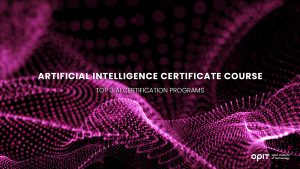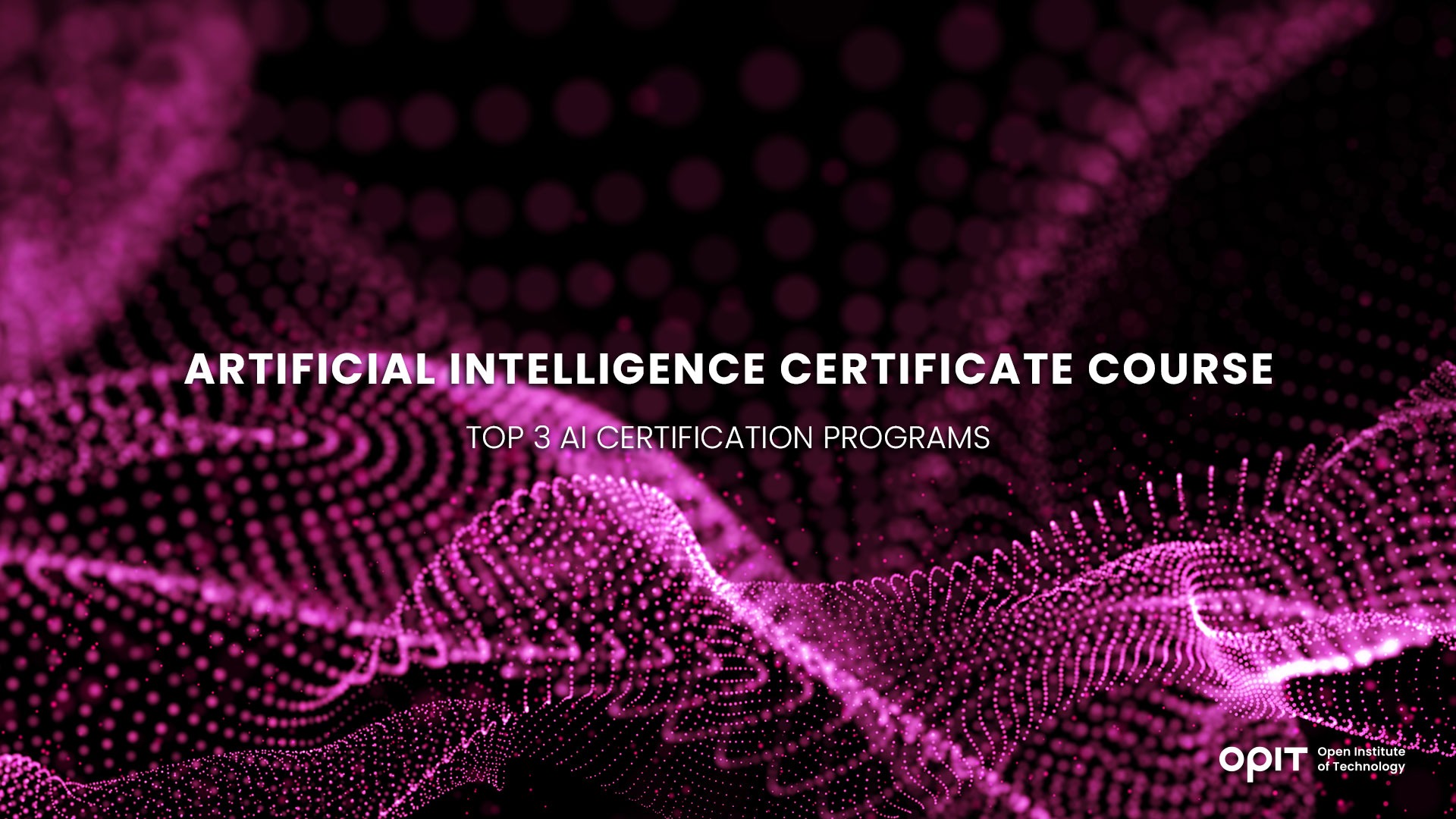

When artificial intelligence (AI) first emerged, it was perceived as nothing more than a gimmick, an exciting sci-fi idea with no practical applications. It took a few decades to dispel these misconceptions. Still, considering the importance of AI today, they’re definitely ancient history.
Since AI aims to simulate human intelligence processes like learning, reasoning, and creativity, it has found its way into numerous industries that rely on these skills to prosper. Healthcare, retail, security, and finance are just some industries that have experienced the benefits of AI firsthand.
As AI permeates more and more of everyone’s daily lives, the need for highly skilled AI professionals is only growing. And if you are to take on a new career, AI is the way to go. This lucrative field offers seemingly endless job opportunities and a unique chance to shape the world’s future.
If you’ve been eyeing the AI career path for a while, an AI certification course can help you get the hang out of the basics and enter this field with a bang. Even if you have experience with AI, there’s always something new to learn.
Whatever the case, you’ll learn something valuable from each AI certificate course on this best-of list.
Benefits of AI Certification Courses
An AI certification course is an excellent way to immerse yourself in this technology and earn a helpful certificate in the processes. And that’s only the beginning. Check out some of the most appealing benefits of completing one of these courses.
Enhancing Career Prospects
Considering the ever-growing power of AI, it isn’t surprising that your prospective employers are some of the biggest tech companies and market disruptors. Google, Amazon, Microsoft, and Apple are just some tech giants looking for employees well-versed in AI.
On top of that, getting certified in AI opens up a world of possibilities in terms of job prospects. Sure, you can be an AI engineer. But with these skills, you can also pursue a career as a data scientist, software engineer, machine learning engineer, and more.
Staying on Top of the Latest AI Trends
The AI field is constantly up to something new. Just when you think you’ve got it all figured out, a new AI craze appears and takes the world by storm. Taking the latest AI certificate course will allow you to stay on top of these trends and even stay ahead of them.
Gaining a Competitive Edge in the Job Market
The demand for AI doesn’t show any signs of slowing down. As people catch on, the field gets increasingly crowded by those seeking a sizeable paycheck. But being self-taught and getting certified in the field are worlds apart.
With an AI certification course under your belt, your career prospects will look much better. Potential employers will perceive you as a worthy candidate from the get-go. Throw some hands-on experience into the mix, and your competitive edge will be off the charts.
Improve Problem-Solving and Decision-Making Skills
AI is all about tackling complex cognitive processes, such as problem-solving and decision-making. So, through learning the AI methodology, you’ll also work on these skills. And the best part is that these skills can benefit you in solving real-life problems and in other fields far beyond AI.
Top AI Certification Courses
If you’re keen on taking an AI course, you’ll have many choices online. Just search the words “AI certificate course” and see for yourself. However, only some courses you encounter will help you achieve your goals. To help you avoid wasting time and money, here are the top three AI certification courses and all the necessary information about them.
1 – IBM Applied AI Professional Certificate
If you’re new to AI, this is the AI certificate course for you. This beginner-friendly program will ease you into the world of AI, teaching you all the terms you’ll need to navigate this field.
But don’t worry, that’s just the beginning. Afterward, you’ll dive into the practical portion of the course and learn how to build AI-powered tools, create virtual assistants, and apply computer vision techniques.
During this program, you’ll explore the following concepts and tools:
- Data science
- Machine learning
- Natural language processing
- Image classification and processing
- IBM Watson AI services
- OpenCV
- APIs
At a pace of 10 hours a week, you’ll need about three months to complete this AI certificate course. Plus, you’re free to adjust this schedule, as the course is entirely self-paced.
As for the fee, you can use Coursera’s free seven-day trial to start. Once those seven days are up, you’ll be charged $39 (a little over €36) monthly to continue studying.
Complete the program, and you’ll earn an employer-recognized certificate from IBM demonstrating your technical proficiency in AI.
2 – Artificial Intelligence A-Z
You might be interested in this AI certificate course if you already have some basic Python knowledge. You’ll start with fundamental AI concepts but quickly move on to hands-on experiences. Learning how to make a virtual self-driving car, creating an AI to beat games, and solving real-world problems with AI are just some practical skills you’ll learn here.
As the name implies, this course will take you from a beginner to an expert in specific AI skills. To achieve this, you’ll need to go through 17 hours of on-demand video lessons, 20 articles, and three additional resources.
For a $99.99 fee (a little over €93), you’ll gain lifetime access to this course’s contents and receive a shareable certificate.
3 – Artificial Intelligence Engineer (AIE) Certification
Learners wanting to earn official certification in the AI field should look no further than this AI certification course. This course’s tagline is “The Qualification that Matters,” and it’s entirely true. After all, this course and the ensuing certification exam are offered by the Artificial Intelligence Board of America (ARTiBA), the world’s leading AI certification body.
This AI certification course functions differently than other courses on our list. The main difference is that you take a certification test after completing the learning portion.
The curriculum for this course includes the following topics:
- Machine learning
- Regression
- Supervised and unsupervised learning
- Reinforced learning
- Neural networks
- Natural language processing
- Cognitive computing
- Deep learning
As you can see, this AI certification course leaves no stone unturned. But don’t let the complexity of the course scare you. Think of it as a path to acquiring highly sought-after skills and job-ready capabilities that will propel your career in AI forward.
The entire program costs $550 (close to €513). Once you pay the fee and register, you’ll have 180 days to master the learning materials and prepare for the AIE certification exam.
Factors to Consider When Choosing an AI Certification Course
Exploring more AI courses beyond these top picks may seem enticing. But before you make a final decision, consider these factors when choosing your next AI certificate course.
Course Content and Relevance
Before starting your search, take some time to assess your current career goals. What AI field interests you the most? What skills do you lack for your dream job? Think of these and similar questions and clearly define what you want to get out of the AI certificate course.
Once you do this, it’s only a matter of determining whether the course’s curriculum is relevant to your career path. Check the course’s description and see if it covers the topics you’re interested in. If it does, it passes the first elimination round.
Course Duration and Flexibility
The next factor is how well your chosen AI certificate course fits your lifestyle. If you’re a student, great; you probably have more wiggle room in your schedule. But you’ll have to find something more flexible if you’re already working and looking to switch fields or improve your AI skills.
The course’s description will also help you in this regard. Check how long the course lasts, whether it’s self-paced, and how much time you must devote to it weekly. Only start the course if you can fully commit to it.
Course Provider’s Reputation and Industry Recognition
As important as the course’s content is, ensuring it comes from a reputable organization is also crucial. Universities like MIT and Harvard are a great way to go. Of course, you should also consider recognized names in the AI industry (Google, IBM, Microsoft, etc.)
Sure, an AI certification course from these institutions looks better on your resume. But you can also rest assured that the content you’ll learn is high-quality, accurate, and up-to-date.
Cost and Return on Investment
You can find plenty of free AI courses on the internet. But if you want the best of the best (and receive a certificate at the end), be prepared to pay a course fee. Take one look at these fees online, and you’ll see prices ranging from €30 to thousands of euros.
But be careful, as the more expensive courses aren’t necessarily better. What makes a high price tag worth it is a whole set of course features. So before paying any fee, research whether the knowledge, support, and certificate you’ll receive will secure many job opportunities in the future.
Master AI and Transform Your Future
With a high-quality AI certification course under your belt, there’s no stopping you in the computer science field. Choose your courses wisely, and you’ll always stay ahead of the competition in the job market.
Have questions?
Visit our FAQ page or get in touch with us!
Write us at +39 335 576 0263
Get in touch at hello@opit.com
Talk to one of our Study Advisors
We are international
We can speak in:




